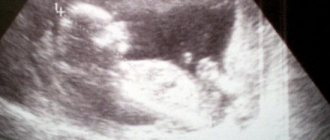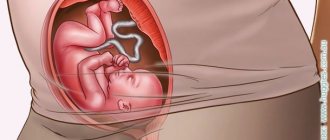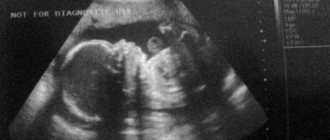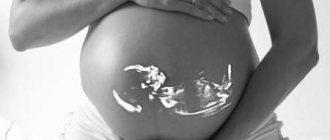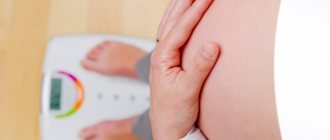Fetal development
The belly is growing, the mother has finally calmed down and began to feel the pregnancy to the fullest, but what happens to the baby?
By the 18th week, the baby’s legs and arms are already fully formed, they already have fingers, and the fingers have phalanges. An individual pattern began to form on the tips of the fingers, according to which fingerprints were taken.
The child's eyes are still closed, but he distinguishes sounds better and better, and already recognizes the voices of his parents. At this stage of intrauterine development, communication with the child is very important. Lightly stroking the belly and the calm, gentle voice of mom or dad give the child pleasant emotions.
The brain continues to develop. The child is growing and gradually gaining weight. Now its size is already 17-18 cm, and its weight is 190 grams.
The fetus is still small enough to feel free in the uterus. He moves very actively, reacting to various sounds with movements of his arms and legs, turns and somersaults.
Mom's feelings
If you are healthy and your weight is normal, you probably feel amazing. The belly has not yet grown enough to slow down the gait completely. True, there may be some unpleasant moments:
- heartburn - due to weakening of the muscle between the stomach and esophagus;
- pigment spots on the face (hormones are acting up);
- constipation and frequent urination (the growing uterus puts pressure on the intestines and bladder);
- difficulty falling asleep (almost any position seems uncomfortable);
- frequent increases in blood pressure;
- slight blurred vision;
- feeling as if the navel ache from the inside.
Some unpleasant sensations can be weakened or eliminated (read the recommendations below), some you just need to endure.
Tummy
What do bellies look like at eighteen weeks? It's different for everyone. Some mothers feel like they’ve swallowed a ball, while others feel like their bellies are stretched from top to bottom. It's all right. Sometimes they even try to guess by the shape of the belly whether a girl or a boy will be born. And yet, only an ultrasound specialist can tell you for sure if you are prescribed such a study this week and the child wants to share a secret.
Photos of bellies
Photo ultrasound
Discharge, pain, complications
- Your breasts are preparing to feed your baby in a few months and therefore produce colostrum. Do not express it, as this may trigger uterine contractions.
- Your vaginal discharge may now noticeably increase. This is the norm, as long as the mucus is white and without an unpleasant odor. Brown, bloody, yellow discharge indicates various problems.
- When you feel a slight tug in your stomach or a ache in your lower back, know that everything is normal. This is how the ligaments and muscles that support your uterus are stretched. But if something really hurts, visit or call a doctor.
- Frozen pregnancy and miscarriage are possible at any stage. In this case, various complications, disturbances in the woman’s well-being and health often occur. Be attentive to your feelings.
- Another complication, sometimes quite severe, is late toxicosis. Read about it and check it out for yourself here.
Visit your doctor on time
If you have not yet undergone your next scheduled examination, your doctor will prescribe several blood tests:
- to the level of hCG;
- on the content of alpha-fetoprotein in the blood;
- to free estriol.
These specific tests will indicate the absence/presence of many fetal malformations and are therefore very important.
If your test results are abnormal, don't be alarmed. One “bad” analysis does not mean anything. You may have prepared incorrectly; mistakes are possible in the laboratory. Even an incorrectly set gestational age can give results that do not correspond to standard indicators. In any case, a study that is unsatisfactory in terms of its indicators must be repeated to eliminate all possible errors.
Let's exercise!
The 18th week is the best time for special gymnastics. It is also called Kegel exercises. To get the point across, go to the toilet and, while urinating, tense your muscles until it stops. This is the main exercise. Do them right:
- Empty your bladder first;
- don't hold your breath;
- Take a comfortable position.
The last recommendation is relative - during the exercises you can stand, sit or lie down, choose what is more convenient. This specific gymnastics strengthens the muscles of the pelvic floor, vagina and urethra.
Watch the video:
We train the muscles of the perineum. Kundalini Yoga Recommendation: Use Kegel exercises every time you urinate 8 times. Recommendations from a birthing class on natural childbirth using the Bradley method are 100 to 200 Kegel exercises per day. How to make it a habit? At any time when you are waiting for something (a line at a ticket office, on the subway, a red light on the road, making a phone call) practice Kegel exercises
Woman's feelings
With the appearance of the first movements, the last fears, anxieties and worries about the baby’s development recede. Now a woman can feel the movements of her baby every day, which brings confidence that everything is fine with the child.
From this moment, the expectant mother begins to fully feel her position, the maternal instinct manifests itself more and more strongly.
The breasts may grow a little more and colostrum may appear. All this is within normal limits.
The discharge at 18 weeks of pregnancy is quite heavy. Normally they are milky or slightly beige in color with a slightly sour odor. The presence of discomfort, itching or redness of the perineum may indicate a genitourinary tract infection. If such symptoms appear, you should immediately consult a doctor. A change in the color and smell of the discharge is also a reason to visit a doctor.
During this period, the risk of thrush is high. If you notice the characteristic cheesy discharge, do not self-medicate even if this is not your first time encountering this disease. Remember: what could be treated before pregnancy may be strictly prohibited for expectant mothers. Contact your doctor, he will prescribe effective and safe medications.
How often and how many times a day should a child move?
Finding two lines on a pregnancy test is an exciting moment in the life of every woman. But she begins to truly feel like a mother only when the baby begins to move in her belly.
And this is where anxiety begins: the expectant mother thinks that the baby is moving too much or, on the contrary, has become quiet for some reason. Are there any rules regulating how many times a day and how often a child should move?
At what week does the baby begin to move in the womb?
Women usually begin to feel the baby's movements at different times. On average, it is believed that this is approximately 19 weeks.
But in general, he has been actively moving for a long time. It’s just that until now the baby is still too small and there is enough space for him in the womb. But by the second trimester, he grows up, gets stronger and can already “communicate” in this way with his mother.
What do the first movements look like?
At first, while the baby is still small, women can only feel light touches from the inside. The first sensations at first are similar to too active intestinal peristalsis, sorry for such a lack of romanticism.
It is quite possible that this is why it is believed that women expecting their first child feel movements at a later date than more experienced mothers. They just already know what to expect.
Thus, it turns out that with the second and subsequent children, mothers can feel how their child is moving much earlier. In addition, there is a dependence on a woman’s physique - thin women will most likely feel the baby earlier, and women with a “body” will feel movements a little later.
So if a woman is expecting her first child, it could be 21 weeks or later, there’s nothing wrong with that.
In what area of the abdomen are the first tremors felt?
The baby's first movements are felt in the area from the navel to the pubic bone. This is where the child is located for this period. Everything that a woman feels above or to the side is, alas, not right. When the baby grows up a little more, then in his activity the mother will be able to feel those same movements, pushes and “kicks” that everyone is talking about.
A lot or a little: how often should a baby kick?
Almost every pregnant woman is worried about the baby's movements. Either it seems to her that the baby is too active, or on the contrary, for some reason he has become quiet. In the early stages, regular activity should not be expected.
At first, these sensations are irregular. The thing is that the baby still has enough space in the stomach. In standard terms - on average it is considered to be 20 weeks - the child is only 18-19 centimeters tall, so he has room to turn around.
So it’s too early to talk about any schedule. Maybe you will feel his movements 5-6 times a day, or maybe a little less often.
In the third trimester, the doctor will regularly ask the expectant mother about the regularity of the baby’s movements in the tummy. In order to determine whether everything is in order, domestic gynecologists offer women a fairly simple Pearson test, which can be easily performed at home.
How to perform the Pearson test?
During the day - from 9 am to 9 pm it is necessary to record the time of every tenth movement. The last, 10th movement must occur before 5 pm. If there were less than ten movements per day, you should consult a doctor.
Let us also add that sometimes mothers simply do not notice the child’s movements if they are actively moving or busy with something. The fact is that when the mother walks and moves, the child rocks in the stomach as if in a cradle. And sleeps. If you feel like your baby hasn't moved in a while, stop your activity. As a rule, this causes the baby to wake up and make itself known.
Let us repeat for mothers: it is reasonable to carry out such a test for the number of movements no earlier than the 28th week of pregnancy. Both week 22 and week 25 are still too early. You can see if everything is okay at a doctor’s appointment when he listens to the baby’s heartbeat.
What to do if your baby moves too often?
Why can a baby push in the womb too often and actively?
- Perhaps mom is not in the most comfortable position. If the child is cramped or uncomfortable, he tries to let him know about it. Watch out, if after changing the position the baby calms down, then you just need to listen to him.
- Sometimes the reason for a child's excessive activity is a lack of oxygen. Thus, he may ask to “take a walk.” Go outside and listen, if the movements become calmer or disappear altogether, it is possible that this was the reason.
- If a pregnant woman lies on her back, the vena cava is compressed, through which blood and oxygen enter the uterus. Roll over on your side and, most likely, the baby will calm down.
However, if these methods do not help and the child still moves too actively, tell your doctor. Such signs can sometimes indicate a threat of premature birth, polyhydramnios or hypoxia. The doctor will send you for additional examination and will be able to provide assistance.
Frequently asked questions on the forums
1:
Q: Second pregnancy, 18 weeks, why don’t I feel any movement?
A: As a rule, with the second pregnancy, movements begin to be felt earlier than with the first. However, this does not happen for everyone. You can feel the first tremors, just like in your first pregnancy, only by 20-22 weeks. If the feeling of anxiety does not leave you, it is better to consult a doctor so that he can confirm that the size of the uterus corresponds to the period of pregnancy and listen to the fetal heartbeat. It is also important to understand that excess weight can interfere with feeling early movements.
2:
Q: 18th week of pregnancy, movements - what are they? How can you understand that these are the baby’s movements and not something else?
A: Fetal movements at this stage are still barely noticeable. They do not feel like strong shocks, but rather feel like light movements inside. Some compare them to bubbles, others to the movement of fish fins or butterfly wings. At this stage they are still weak and tender. The appearance of such sensations during loud, sharp sounds or when stroking the abdomen indicates that it is the child who responds to external stimuli.
3:
Q: Why shouldn’t pregnant women sleep on their backs?
A: As the uterus grows and gains weight in the supine position, it begins to put pressure on the vena cava, which runs along the spine and is responsible for the blood supply to the legs. Clamping this vein for a long time can lead to oxygen starvation of the child, which will negatively affect his development. Regular compression of the vena cava, for example, while sleeping on the back, can cause poor health in the mother and the development of defects in the child.
Movements at 18 weeks | Women's magazine online - EVA.RU | Pregnancy
- Girls, help, please. I’m exhausted, I just don’t have the strength anymore. I’m tormenting myself and my family, I’m walking around in tears, I’m stressing myself out, as everyone tells me, in vain... I’m 18 weeks pregnant. I have a history of 1 healthy pregnancy, childbirth, everything is fine, the man is growing. And I was still frozen, it’s clear at what stage, at 20 weeks discovered last year. The reason was not discovered; I submitted everything I could, including a karyotype. I was sick a lot during pregnancy, maybe that’s why... Now you can’t get to the bottom of it. And here it is, the long-awaited healthy pregnancy, according to the ultrasound (the last one was a week ago) everything is fine, there’s nothing to complain about, everything seems to be according to the book, but that very worm is terribly sharpening me that somewhere during this period the last pregnancy ended. I listen to myself constantly, I have been feeling movements for a week now, BUT!!! They are weak and rare. Yesterday they were stronger; at lunchtime I kicked him a couple of times. Then silence until the evening, before going to bed it still made itself felt, but for this I had to lie on my back and freeze, then after some time the kicking began. It is impossible to confuse it with anything - right above the pubic bone. Then, neither at night, nor in the morning, nor now I feel anything. Is this “literally a couple of times a day” normal at this stage? I read on the Internet that movements should be counted, there should be 10 episodes. What are the 10 episodes??? pregnancy, it seemed to me that everything should feel great, the attachment on the back wall... Well, why don’t I hear it during the day???
- stop panicking) I’m pregnant for the second time. I thought, and the internet said, I’ll feel some movement sooner, nevermind...at 18 weeks, once in the evening, lying on my back after eating. At 19 - again in the evening, now 20 - the Internet says one thing, for me mostly in the evening and at night, sometimes in the morning after coffee... it clearly kicks 1-2 times, then the rolling is quiet only if I sit, walk - I don’t feel it. The doctor listens, ultrasounds are often done for a different reason - everything is individual for everyone. You are simply ruining the mood for yourself and those around you with your nerves! Go to the doctor, let him listen, do one more ultrasound to calm down! Good luck to YOU, everything will be fine!
- Calm down and think only about good things. I have the first B, the wiggles - everyone is surprised, from 16 weeks, but also rare... at first just a kick, then a couple of times a day, at first an interval of 4-5 days, then 3-4, at 20 weeks they became more noticeable.. but again , maybe every day, or maybe once every 3-4 days, I tormented myself so much that I almost went crazy, even though I went for an ultrasound every day. Can not be so. I convinced myself that as a child, when I relax in the fresh air or walk a lot, he gets rocked and doesn’t even think about fluttering. Your baby will grow up and will give you a hard time in your liver or lungs. Today I’m 25 weeks, but the hair still hasn’t become what I imagined and read about on the Internet. In the morning for half an hour and in the evening sometimes not for long... and that’s it... not everyone apparently feels it every 3 hours. If I thought that there should be 10 episodes a day, either I bought an ultrasound machine for myself a long time ago or I would go for an ultrasound every day. Give yourself only a positive attitude..
- Thank you very much! I read on the Internet that people from 13-14 feel it and they have a real disco going on there))) I’m scratching my head that I feel a child once a day, and the rest of the time what does he do - sleep? Doesn’t move? My brain is boiling, I don’t remember a thing from the first! Thank you very much for your support, it’s even easier that I’m not the only one. I keep thinking that he feels bad there, since he doesn’t move normally. I can’t say anything about my stomach either - it’s grown, but it doesn’t get noticeably bigger while it’s still there costs…
- Thanks for the answer!!! That’s right, I’ve been thinking up all sorts of nasty things for myself, so I just want to enjoy and relax!!! Girls, what would I do without you... Well, at least they calmed me down a little! Otherwise, on Russian forums it’s all over everyone everyone moves and literally breaks ribs with their feet)))) Hourly))))
- For you it’s like that, for someone else it’s like that, children are different, people are different, pregnancies are not alike, they write a lot on the Internet, the shape of the abdomen determines the gender, according to the descriptions - diagnoses... there are ultrasounds and doctors... the rest is guesswork. I also thought that it would be the same in both pregnancies, especially now it’s a boy again, NO! Everything is different, movements later, less often, the stomach merged with the sides, more than in 1 B, not acute, in the 1st trimester I felt sick, although in 1 B there was none at all, I ate donuts and cakes, and in 1 B meat and tomatoes. In short, everything is individual. This means different children, different characters... everything is normal. Everyone has their own problems in B... mine is that time goes by slowly... very, with the fuss with the elder, work, and the life of the engine - everything seems to me slow.....)))
- You are speaking directly in the words of my husband))) He also insists that the children are different, and according to the ultrasound everything is fine - what are you pushing? Go and be happy, but no, the ultrasound lasts me an hour, and then again I think that there’s a catch somewhere)))))))) I’m writing and smiling myself, I understand the absurdity of the situation, but I want to constantly receive evidence that everything ok, control the process, and NOBODY can do this. So I’m going crazy. You’re absolutely right about the different sensations! My belly is bigger now, and my food cravings are different, and I’m completely different in appearance, in sensations...
- There should be 10 episodes after 27-28 weeks, and then it’s different for everyone) in the second B, at 18, I just started to feel movements, and not every day. I weighed 50 kg and had a big belly, and I couldn’t understand how I didn’t I feel it was also on the back wall. So calm down, stop running to doctors and better yet take a walk)) or if you’re really worried, buy a device to listen to your baby’s voice and you and your baby will be calm)
- and on my back wall, at 18 weeks in the evening, and then - in the evening and not all the time, there were 2 days of silence, it was scary, but then I turned and hurray) They listen to the doctor with a tube and a thing just like on an ultrasound - the heartbeat is immediately audible) Everything is individual . She herself up to B is 53 kg, 166 cm. There are no standards! )))
- Be sure to do an ultrasound with Doppler at 19 weeks and then repeat at 23-24 to calm down. To see if the blood flow is normal. Maybe the baby is just so calm or the attachment on the front wall is not very noticeable. Have you checked the blood for hemostasis, d-dimer? It’s true that this can only be done for a fee. I only felt the first movements in 1 ber at 19, in principle, it’s too early to worry, but of course with such a story it’s better to play it safe.
- What does d dimer, coagulation and its movements have to do with it? Hemostasis is one thing, activity is another.
- 10 series of 10 movements are mandatory after 27 weeks. A lot depends on the location of the placenta, on the sensitivity of the mother, on the condition and even (they say) the temperament of the child. My boys both kicked from 16 (junior) - 18 (older) weeks. But my niece started kicking closer to 23 weeks, very delicately. A healthy girl is growing up, soon 10 years old, half a bride already.
- Thank you for sharing your experience! We are also expecting a girl, maybe our delicate one))) And my son also kicked, and I felt it much earlier. Boys are like that)))
- Author, I also had a frozen one. I reassure myself that a shell does not fall into the same crater twice. This has already befallen us and will not happen again. Moreover, nothing was found. It means there was just some kind of glitch...for example, I was conceived in the summer, when the peat bogs were burning, everyone was dying from the smog. I am an ecologist and I understand what poison this is..... Many people suffered then (((((
- They copied everything from me exactly like yours. I finally felt movement at 20 weeks.
- Why only paid? They gave me directions for hemostasis, free of charge.
- Yes, everything will be fine, don’t worry! For example, I heard that strong and frequent movements should be very alarming.
- Author, what are 10 by 10 at 18 weeks? Some, or even many, don’t even feel anything at this stage! If I were you, I would buy myself a Doppler, which is what I did, from 10 weeks I listened to the heart
- Well, to be honest, it’s a useless waste of money.)) but if you’re really nervous, then 3000 will save the situation))
- Alternatively, fetal fading in the later stages may be due to blood flow disturbances. And blood flow disturbances from problems with hemostasis. Micro blood clots in the placenta, etc. And as a result, hypoxia and so on. With hypoxia, some babies may, on the contrary, spin more, some less. But of course there is little movement at this stage - this may simply be a feature of the child himself, or a feature of the placenta insertion, or the sensitivity of the mother...
- I didn't know. Lately, it turns out that we have also received d-dimer in our residential complex, but still not all of them have the indicators that the hemostasiologist asks for.
- IMHO, the child should not give out anything at this time. It is still too small, there is plenty of room and it can quiet down for a very long time. Until the 25th week, if not longer, I had very weak movements, but then it hit me!) Tanya, is this not you?
- No, not Tanya))) But thanks for the support!
Source: //eva.ru/pregnancy/messages-3258484.htm
What should a mother do at 18 weeks?
Now, as always, the main thing is proper nutrition. It is necessary not only for the proper development of the child, but also for the normal well-being of the mother, since throughout pregnancy women face various problems of the digestive system.
For breakfast you need to eat heavily. Don't forget about grains and grains. You can eat a sweet bun or something tasty. For lunch it is recommended to eat soups, preferably chicken or fish. You can have cottage cheese and fruit for dinner; it is better not to overeat before bed. In between main meals, it is recommended to snack on fresh salads, fruits, nuts, and dried fruits. For drinks, preference should be given to fruit drinks and juices.
If you really want to, you can drink a cup of coffee with milk or strong tea. Occasionally you can treat yourself to fast food, but you should not include it in your daily menu. Healthy, vitamin-rich foods are preferred.
By this time, a woman’s weight increases by 3-5 kg. The belly is already clearly visible, and it’s time to buy beautiful blouses and dresses in the babydoll style.
First half of pregnancy
Before considering the reasons that some women do not feel movement at 17 weeks of pregnancy, it is necessary to look at the first half of the period. Many women, especially those who are experiencing such a fascinating and at the same time frightening process as pregnancy for the first time, may not know exactly when they should expect movements and tremors.
It’s worth saying right away that for most of the first half of your pregnancy you shouldn’t worry about anything. Up until the sixteenth week, you will not feel any movement at all, because the fetus inside does not yet have sufficient mass and movement capabilities to allow the woman to feel something that is happening inside. Accordingly, you should not worry if you do not feel any movements.
But what happens when the period passes the sixteenth week? Why do many women not feel movement at 17 weeks of pregnancy? It's time to deal with this issue.
Tests at 18 weeks of pregnancy
At 18-22 weeks of pregnancy, expectant mothers will have a second scheduled ultrasound. It allows you to determine how the fetus develops and analyze the condition of the placenta. An ultrasound examination at 18-22 weeks already allows you to accurately find out the sex of the child. It is best to undergo this ultrasound together with your dad, because this is a chance to see your daughter or son for the first time.
In addition to determining the sex of the child, this ultrasound examination will help evaluate possible malformations that could not be detected during the first trimester screening, since the fetus was still very small.
Ultrasound norms at 18 weeks of pregnancy
| Index | Meaning |
| BPR (biparietal head size) | 32-47 mm |
| LZR (fronto-occipital head size) | 43-64 mm |
| DBL (femur length) | 18-32 mm |
| DBB (tibia length) | 16-28 mm |
| DP (humerus length) | 19-31 mm |
| DPP (length of forearm bones) | 17-23 mm |
| OG (head circumference) | 131-161 mm |
| AB (abdominal circumference) | 104-144 mm |
In addition to fetal fetometry, an examination of the umbilical cord, placenta and amniotic fluid is carried out. Normally, the amniotic fluid index (AFI) at the 18th week of pregnancy should be 80-220 mm.
The specialist measures the main indicators that may indicate the presence of certain deviations from normal development, and draws conclusions about the baby’s current condition. If there are any abnormalities, the woman is sent for further examination and consultation with a geneticist. Minor deviations from the norm, as a rule, only indicate an increased risk of developing pathologies or defects. Usually in such cases, the doctor prescribes a specific treatment regimen that can eliminate these risks. If during the examination the presence of Down syndrome, Edwards syndrome, or other pathologies is identified, the woman will be offered termination of pregnancy.
If the results of the first screening are outside the norm, or the woman is at risk, in addition to undergoing an ultrasound, she should donate blood for biochemistry. This should be done at 16-18 weeks; the 18th week of pregnancy is the last opportunity to evaluate the results of a biochemical blood test. Later, the data obtained will be uninformative, so you should not postpone this important analysis until later.
Video:
Questions - answers
Colostrum is leaking from my breasts. Is this normal at 18 weeks of pregnancy?
The release of colostrum at 18 weeks of pregnancy is considered normal. It begins to be produced in pregnant women in the second trimester of pregnancy. The first symptoms are tingling in the chest. Most often, colostrum begins to be released if the air temperature in the room where the pregnant woman is is high, when the nipples are stimulated, or when there is stress. The main thing now, after the start of colostrum secretion, is to properly care for your breasts. It is recommended to wash it regularly with cool (not cold) water, then gently dry the breasts with a cotton towel. The bra contains circles cut from cotton fabric, which are changed regularly.
What is screening, triple test? Why is this study needed at 18 weeks?
Screening is carried out in the first and second trimester of pregnancy. First trimester screening is scheduled between 11 and 14 weeks. Screening at 18 weeks of pregnancy is a second trimester screening. It is carried out from 14 to 20 weeks. The best time for second trimester screening is 16-18 weeks. This analysis determines the pathology of fetal development. It can help identify the risk of Down syndrome, spina bifida and many others. Additionally, an ultrasound is prescribed, which helps to more accurately establish the diagnosis.
If the second trimester screening did not show very good results, you need to consult a geneticist. The doctor, through a conversation with you, will find out what reasons could influence the result of the analysis. He will carefully study all the tests, ultrasound, and if his conclusion is that there is a genetic pathology, then you will be offered to do amniocentesis. Amniocentesis is a puncture of the amniotic membrane to take amniotic fluid for analysis. Using this analysis, you can diagnose the presence of congenital and hereditary diseases.
I don't feel any kicks at 18 weeks pregnant. Is this normal or not?
The onset of fetal movement is considered normal between 16 and 22 weeks. Very often, obese women do not notice the baby's kicks. Only after visiting the doctor do they find out that the baby is already moving. If this is your first pregnancy, then it is likely that you will feel the first movement of the baby around 20 weeks of pregnancy. If you are worried about your baby, then contact your gynecologist, he will conduct an examination.
I feel sick at 18 weeks pregnant, what should I do?
Toxicosis usually stops by 16–18 weeks of pregnancy. But, according to statistics, in 20 percent of women, toxicosis continues until the third trimester. Most often, the cause of nausea at this stage of pregnancy is associated with high levels of hormones and the emotional state of the woman. If nausea turns into vomiting, this is hyperemesis gravidarum. This is a serious condition that causes significant weight loss. If nausea at 18 weeks is accompanied by abdominal pain, if you are experiencing significant weight loss, severe bouts of vomiting, you should seek help from a doctor. The doctor will find out the causes of this condition and prescribe treatment for you.
To get rid of nausea before eating, try to do an exercise - one hand on your stomach, the other on your chest. Inhale and exhale deeply, and so on for 3 to 5 minutes.
Try to rest more often. Do not eat spicy seasonings, smoked meats, or fatty foods. Drink as much water as possible, eat food in small portions, but more often. Introduce foods rich in vitamin B, magnesium, zinc, and folic acid into your diet.
If this is your first pregnancy, then the 18th week is a particularly exciting period for you, because you begin to feel the baby moving. However, many new mothers will experience this joy only at 19-20 weeks, especially if they are gaining excess weight. Many women will agree that this feeling is difficult to describe, but for some it resembles the state before a banal indigestion.
Multiparous women begin to feel fetal movement, which is a manifestation of spontaneous activity of the fetal muscles (periodic phasic contractions of the extensor muscles, which are generalized). Movement is usually felt 4-8 times per hour. The frequency of movements increases when the mother's blood, and as a result the fetus, is depleted of nutrients and oxygen.
During the motor activity of the fetus, its heart activity increases, blood pressure rises, blood flow throughout the body and through the placenta accelerates, which leads to an increase in the amount of oxygen and nutrients in the blood. The motor activity of the fetus contributes to the development of its muscles and brain.
The uterus is already almost at the navel. You can measure it yourself. Place your hands on your waist and feel the fundus of your uterus. It is located two finger widths below the navel, or about 2.5 cm. The uterus is now the size of an average melon. Since the beginning of your pregnancy, you may have gained between 4.5 and 5.8 kg in weight. If you gain more, consult your doctor: you may need to see a nutritionist. After all, you have more than half of your pregnancy ahead of you, and you will get better and better.
Of course, it's stupid to go on a diet during pregnancy, but you should definitely control your calorie intake. After all, the baby receives nutrition from your body, that is, from the food that you eat. And this nutrition should be complete.
Weight gain during pregnancy can tell you how your baby is growing. Over the entire period, the increase should be from 11 to 15.5 kg. If you gain more, you will have a harder time getting pregnant and will have a harder time giving birth. In addition, it will be very difficult for you to lose these extra pounds later.
You may have a stuffy nose because the septum in your nasal passages becomes slightly swollen during pregnancy.
Sleeping and resting lying down may already be causing you some discomfort as your uterus continues to grow and requires more and more space in your abdominal cavity. Try to find the optimal position for resting and sleeping by placing pillows and pads under your legs, chest, etc. Give free rein to your imagination - only it will allow you to build an acceptable, most effective design from these same pillows. You can also perform tilts and rotations with your pelvis before taking a horizontal position. A full bladder also increases the feeling of discomfort.
Fetal age – 16 weeks. The growth rate of the fetus by this time slows down slightly. But it continues to grow and change.
Until now, your baby is literally skin and bones - the muscles are there, but the fat has not yet appeared.
Facial features are becoming clearer every day.
A girl has a maximum number of eggs in her ovary, about 5 million; by the time of birth, their number decreases.
Your baby in the womb is already beginning to perceive the outside world and makes itself known by pushing into your stomach with its foot. The child even hears you: the auditory ossicles, through which sound passes into the middle ear, have already become stronger, and the part of the brain responsible for receiving auditory signals is working. The baby is not frightened by the sound of blood flowing through the umbilical cord or the beating of your heart; but loud sounds frighten him. You will soon notice that your baby reacts to loud conversations or music with stronger kicks.
